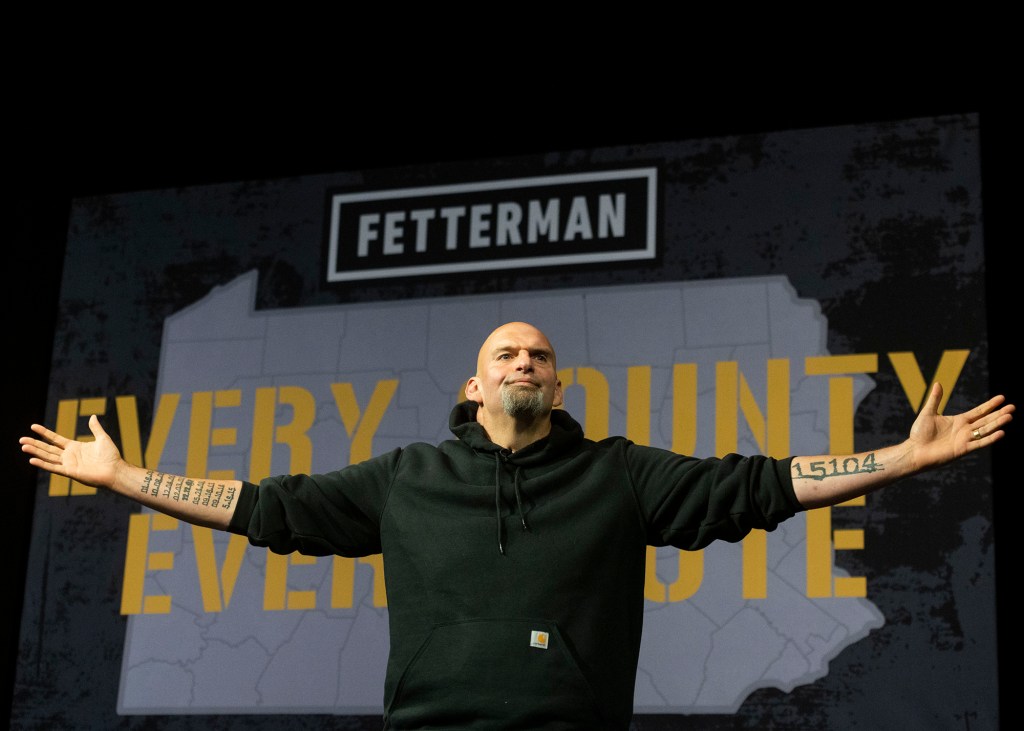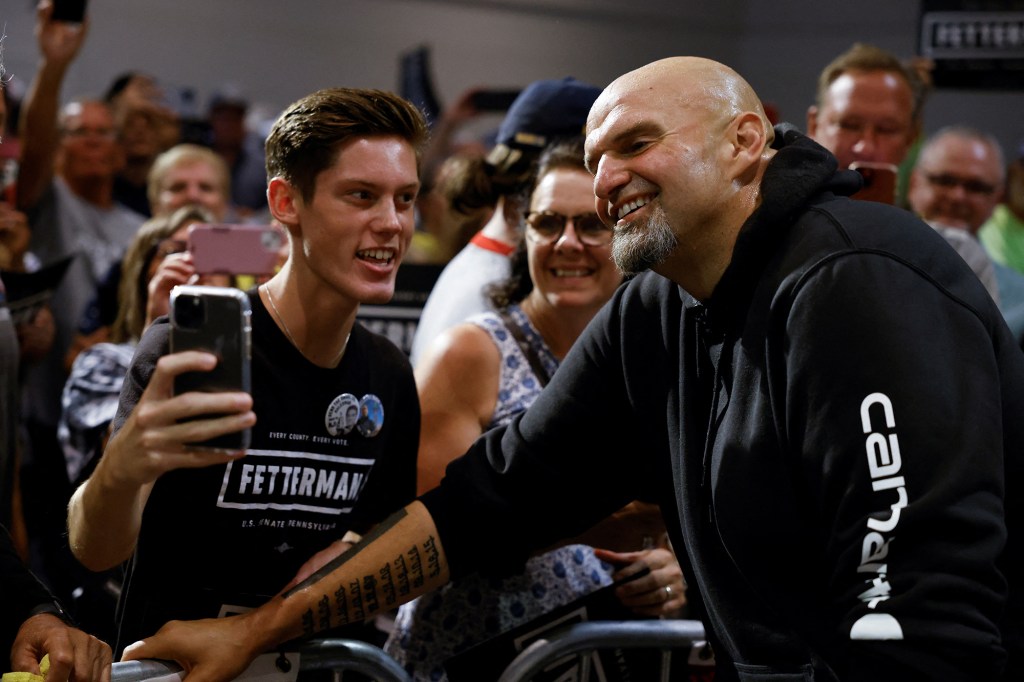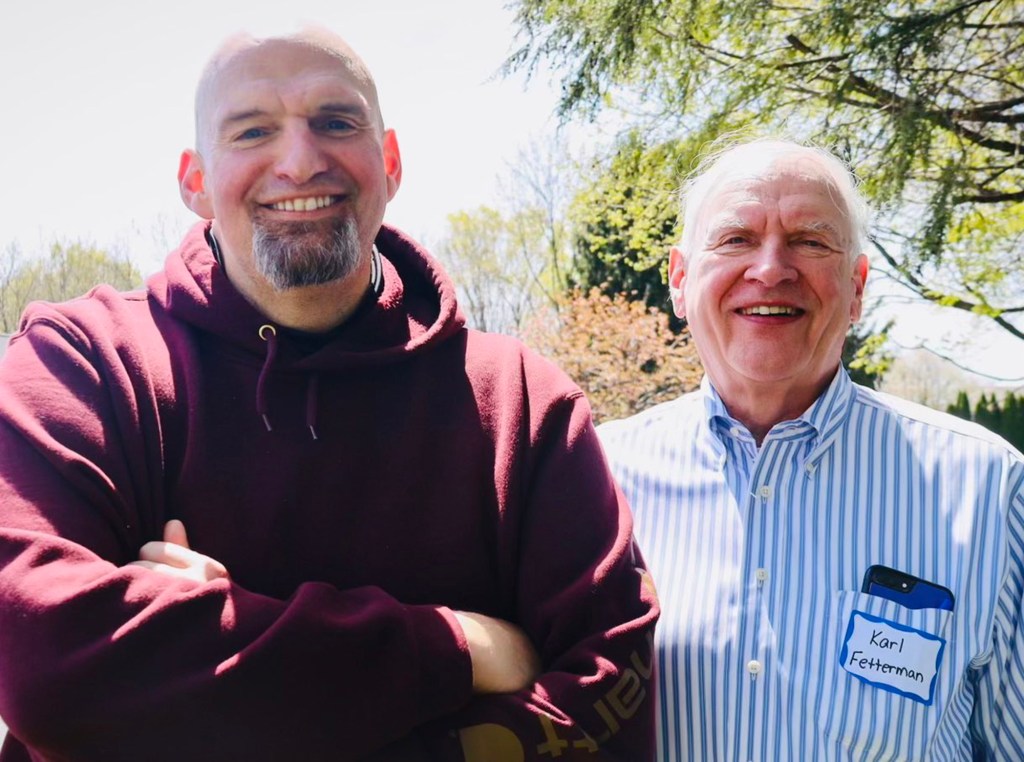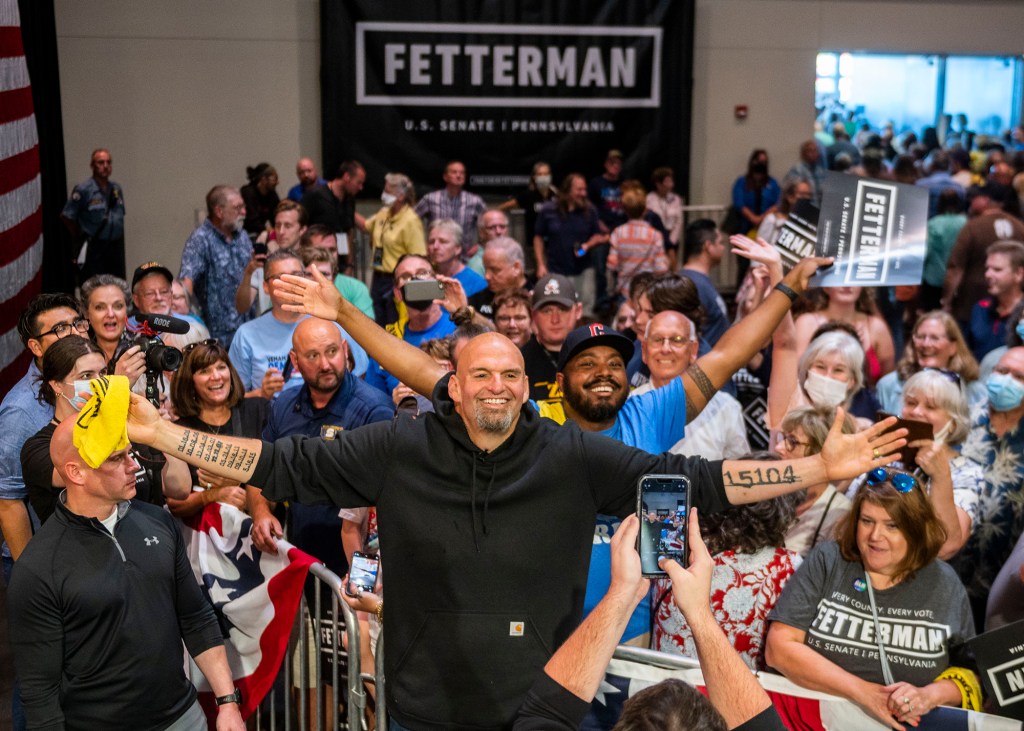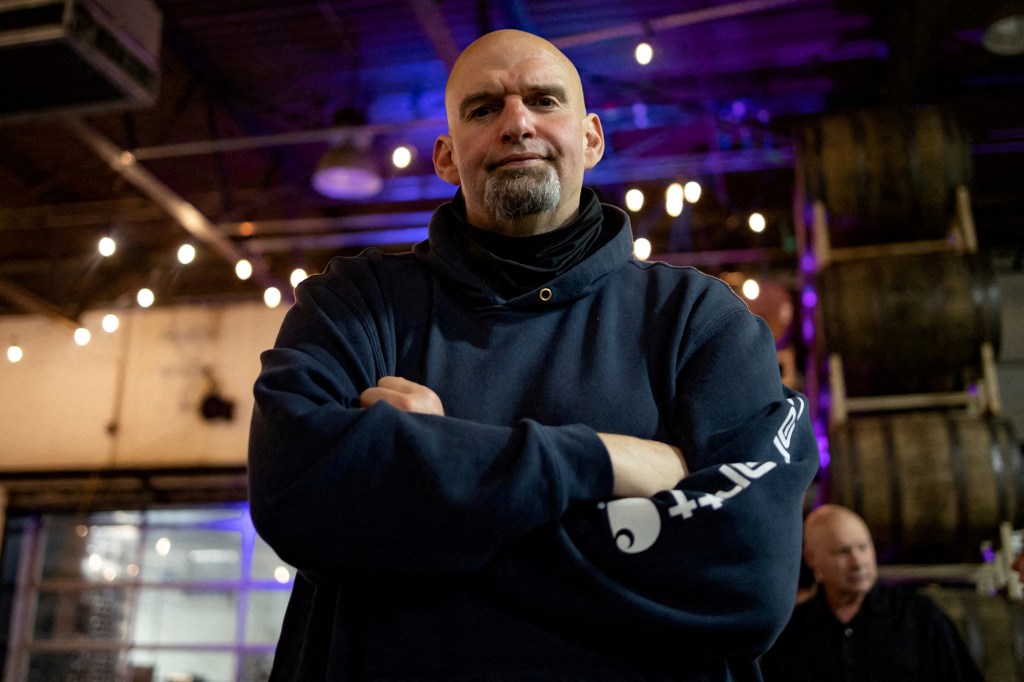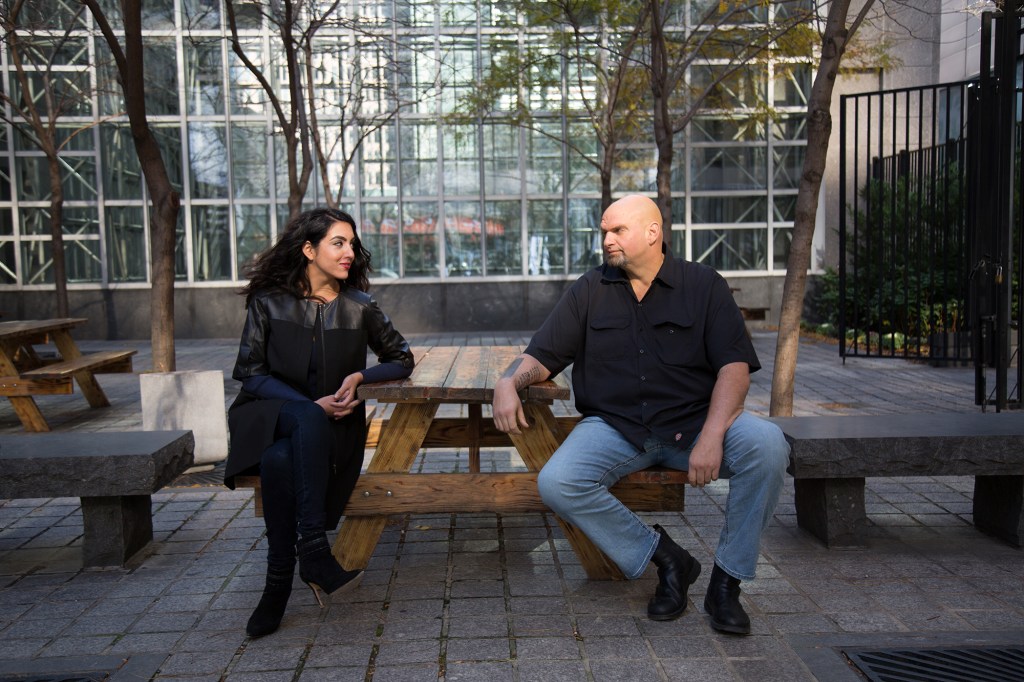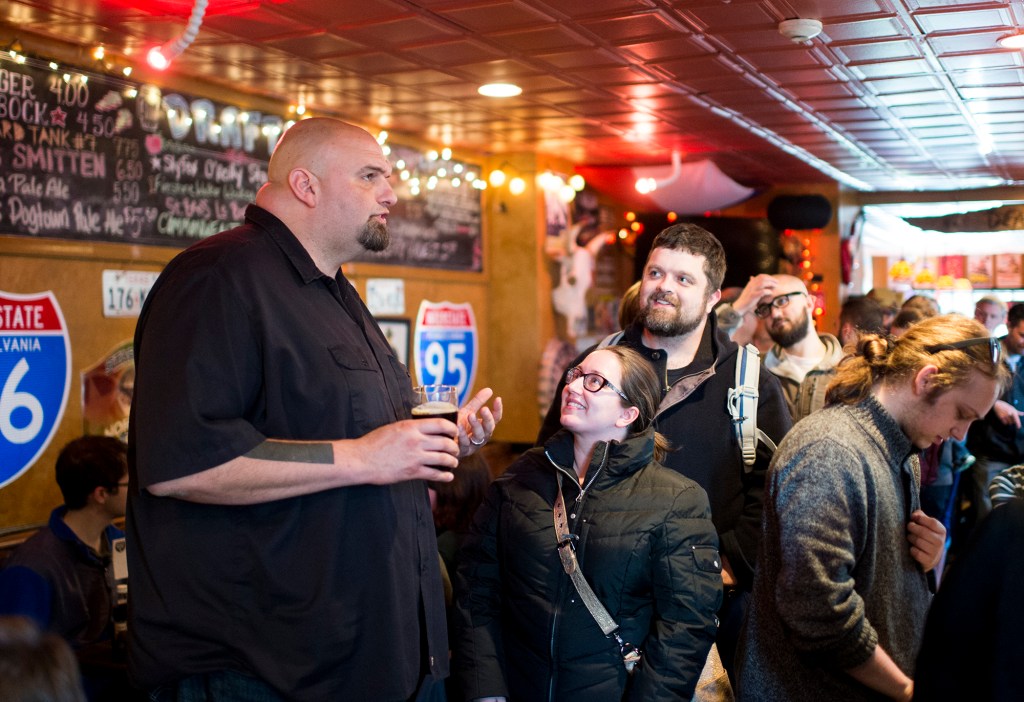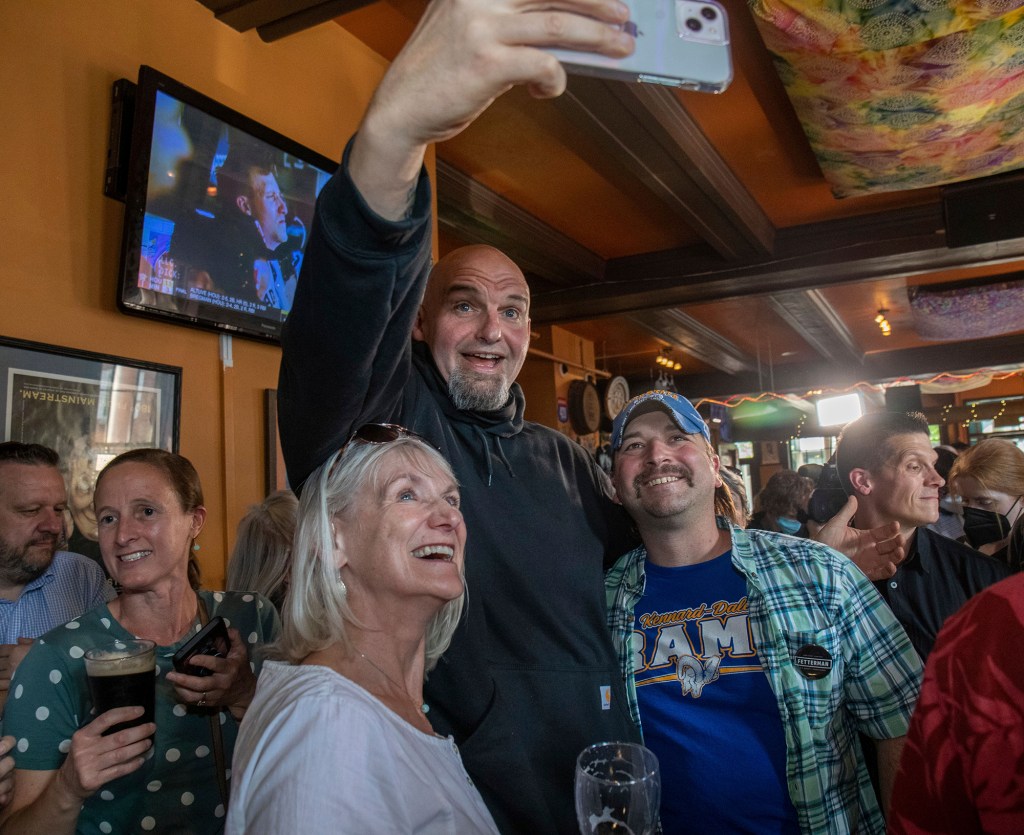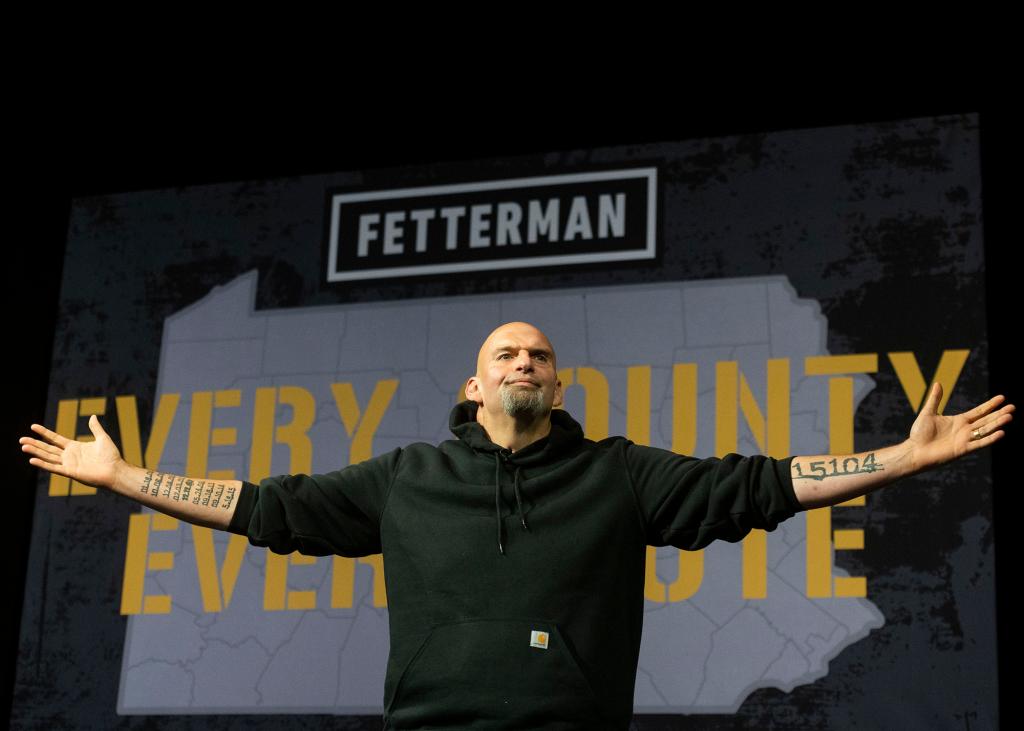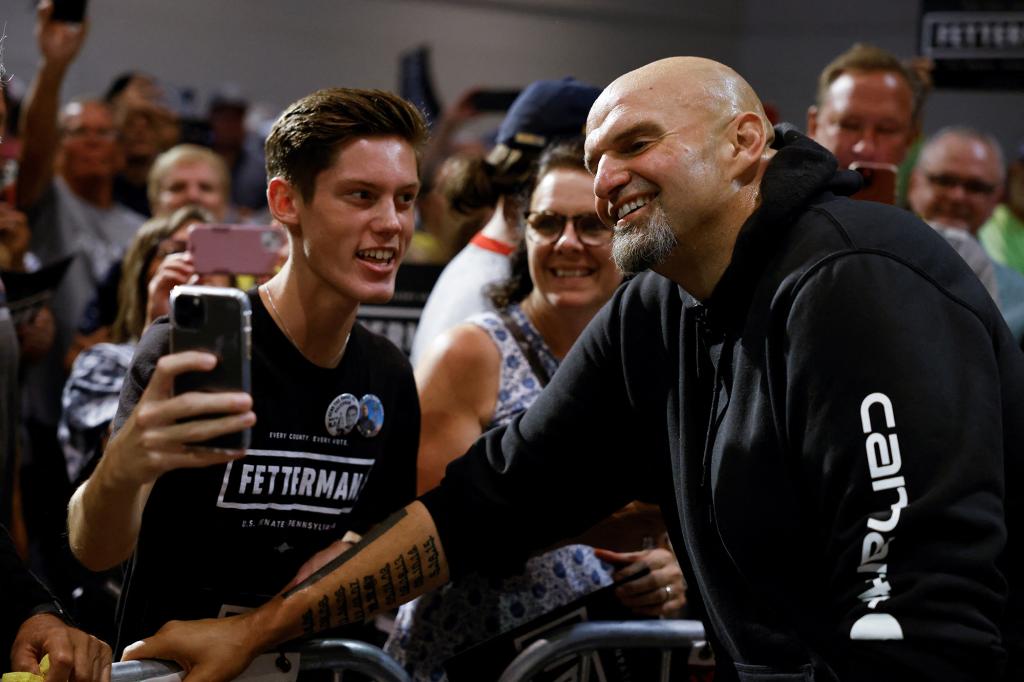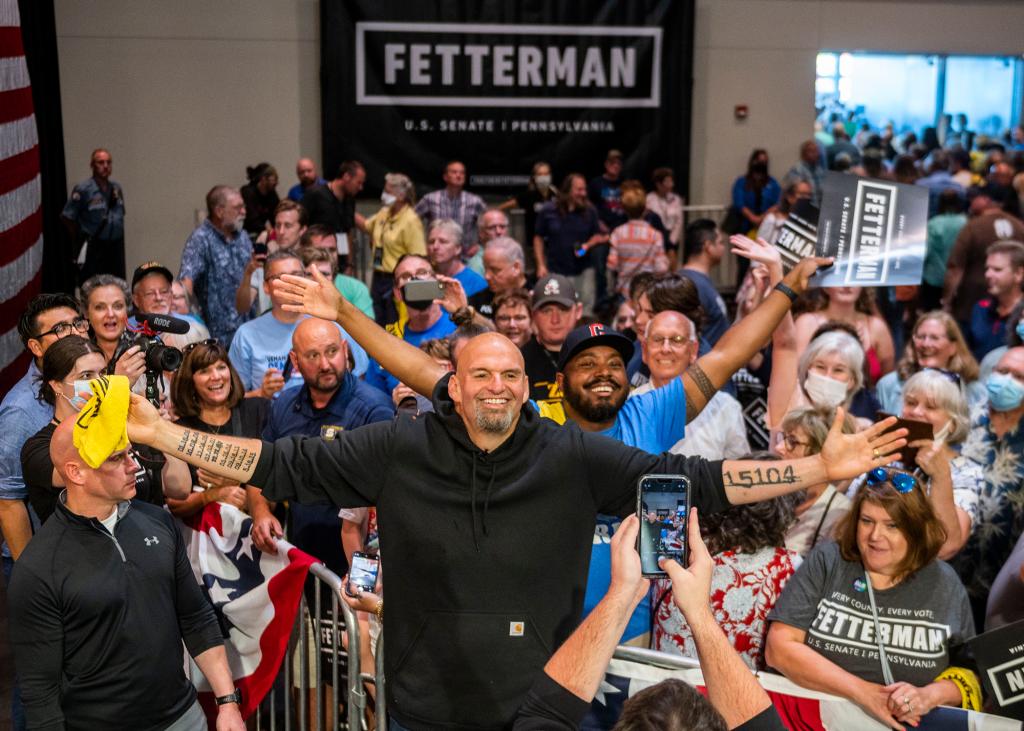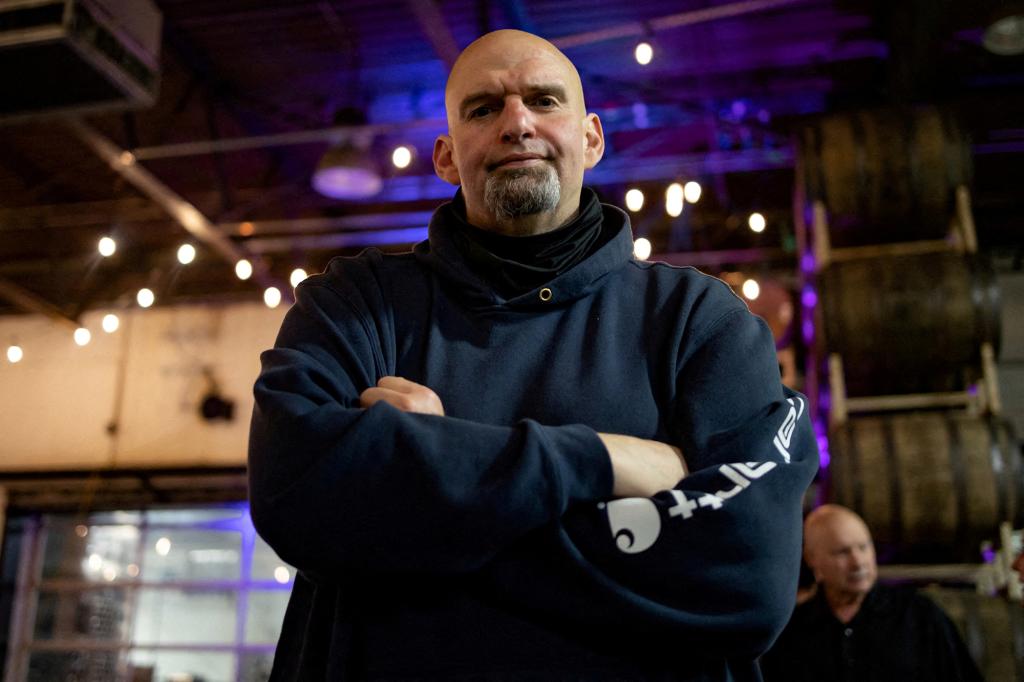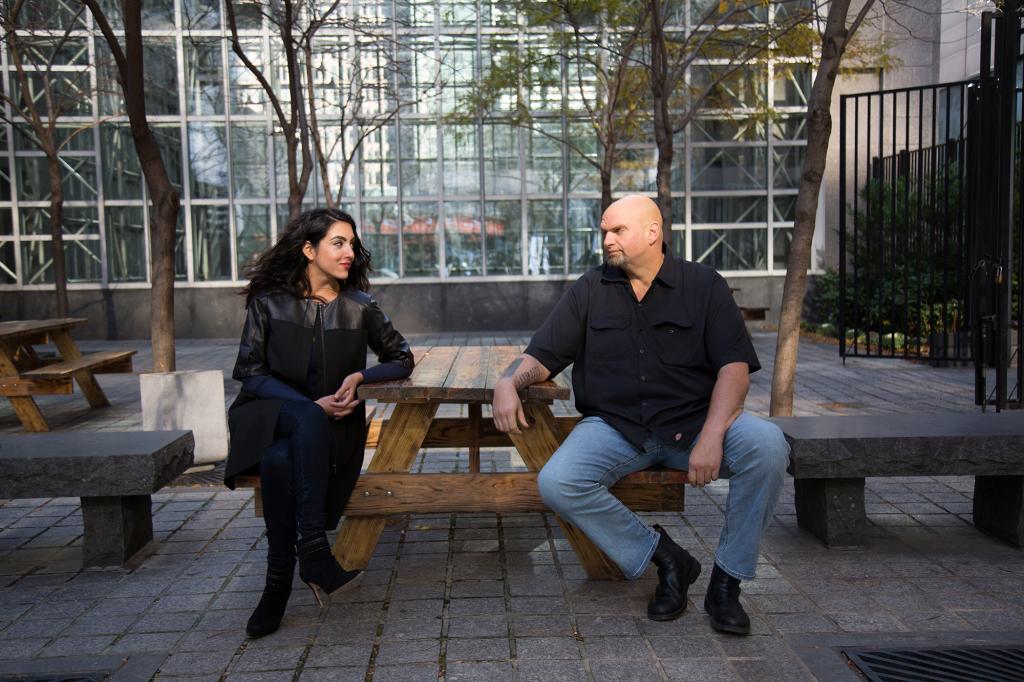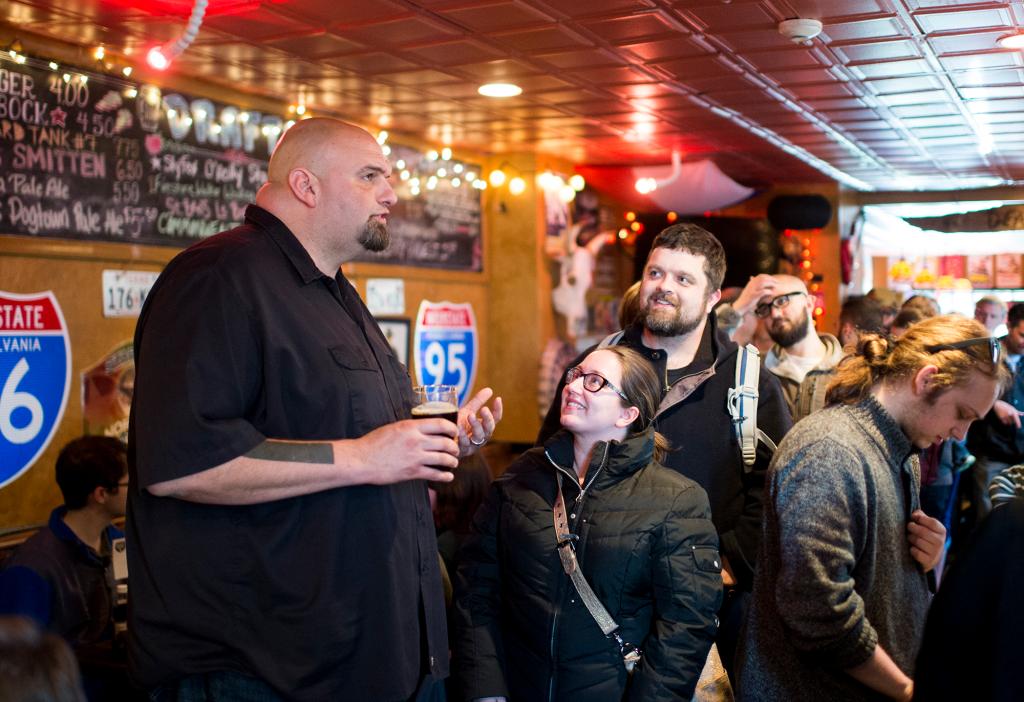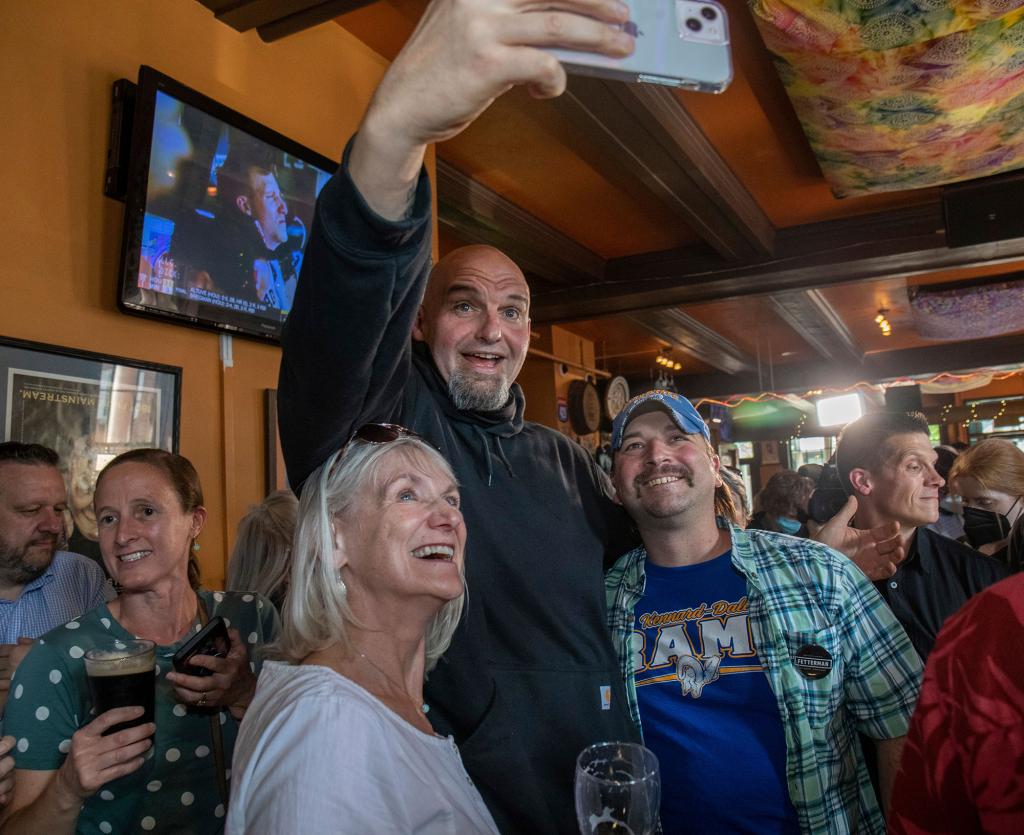That’s rich: How stroke-hit Fetterman sponged off his tony parents ‘til he was 49 but now attacks Dr. Oz’s wealth in bitter Pa. Senate race
Last Friday, John Fetterman stepped on a stage in Erie, Pa., to hold his first public rally since he suffered a stroke on May 13.
The Democrat running for US Senate in Pennsylvania received a hero’s welcome from the crowd, who twirled Pittsburgh Steelers Terrible Towels in the air. The 6-foot-8, bald and goateed Fetterman sported his signature black hoodie with the sleeves pushed up to reveal large tattoos, as he went on to offer a comeback story that has always been his brand.
“Three months ago, my life could have ended, but I’m so grateful to be here as well,” he said. Later, he joked, “There’s a lot of differences between me and Dr. Oz. Who would have ever thought that … who would ever think that I’d be the normal one in the race here?”
The crowd roared with laughter. Currently, polls show the lieutenant governor of Pennsylvania ahead by 8.7% against the Trump-backed Dr. Mehmet Oz. But, during his 11-minute speech at the Bayfront Convention Center, Fetterman, 53, stumbled several times over his words, often repeating them, as his voice wavered. Several who were in the crowd that night told me they were worried about his health and ability to go the distance.
“I agree with John on virtually all of the issues,” said one Harrisburg-based Democrat. “[But] his performance in Erie gives me a little bit of pause and I think the pivot point will be the two or three debates that must take place in the fall.
“If John will not debate his opponent, then I think all bets are off,” he added.
Since his stroke, Fetterman has mainly been debating Oz on Twitter. He has relentlessly trolled the celebrity doctor on social media for being an elite carpetbagger from New Jersey, and recently raised half a million dollars for his campaign by mocking Oz for calling a veggie tray “crudité.” He also paid to fly a plane over the Jersey Shore with a banner screaming “Dr. Oz, Welcome Home to N.J.!”
On Wednesday, the two candidates sparred over who is more of an everyman. After Oz seemed to forget how many houses he owns (he said “two” when the correct answer is 10), Fetterman pounced. “I’ve never spoken to a PA resident who doesn’t know how many houses they have … let alone be off by 8. I can’t tell if he’s trying + failing to sound like a regular person (with ONLY TWO mansions) or if he genuinely has no idea,” he tweeted.
To that, Oz shot back: “I purchased my houses with MY money. You lived off your parents until you were almost 50. Regular people don’t mooch off their parents when they’re 50. Get off the couch John!”
Fetterman’s father, Karl, is a successful businessman and founder/owner of Kling Insurance in Pennsylvania. Not only did Fetterman grow up in the wealthy suburb of York, Pa., his parents financially supported him and his family for the entire 13 years he was mayor of Braddock — a part-time job that paid him just $150 a year — until he was sworn in as lieutenant governor in 2019 at the age of 49. In 2015 alone, his parents paid him a $54,000 salary.
He lives with his wife, Gisele, and their three children, in a spacious Braddock loft that his sister purchased for $70,000 and then handed over to Fetterman for just $1.
“The one thing people never hear much about is his upbringing and how he’s earned a living over his life. Obviously he has done good things, and that’s an important part of the story. But it’s not the whole story,” said Pennsylvania-based Democratic strategist Mike Mikus.
When asked about his privileged roots, Fetterman told me via text from his personal cellphone: “Look, I’m proud of my upbringing … I was on the path to be a successful businessman but I changed paths and have dedicated my life to fighting for forgotten communities.”
But Fetterman’s attempts to stand up for the common man have sometimes backfired. On July 24, he tweeted a photo of himself next to a photo of a pump at a Sheetz gas station with the caption: “Filled up the ram… Over $100 WHAT?!?! Dr. Oz won’t stand up to the special interests + corporate executives who are raising prices on us, but I will.”
Sheetz is a family-owned Pennsylvania company founded in 1952 that now employs over 20,000 people. Voters in the red area of Blair County, where Sheetz is located, see the business as an example of American exceptionalism — not corporate greed — and they were not amused by Fetterman’s barb.
Fetterman’s spokesman Joe Calvello said the tweet wasn’t a dig at Sheetz, even though the candidate was standing at a Sheetz pump in the tweet. Fetterman believes Sheetz is “the best gas station in the world,” Cavello added.
Because Fetterman has not appeared at any major events beyond the Erie rally, it’s unclear what he thinks about many of the major issues of the moment, including fracking — a huge economic driver in this state — and the recently passed climate change and tax bill and its impact on families and small businesses.
Still, he just might win the race by avoiding any scrutiny from the press, lying low on the campaign trail, avoiding any debates with Oz, and tweeting himself into office.
When asked how many debates he will participate in, Fetterman replied via text from his cellphone: “I am up for debating Oz, but I am not doing it on Dr. Oz’s terms.”
All debates are sponsored by local nonpartisan news organizations not affiliated with Oz, nor does either candidate set the terms. When pressed, Fetterman said his answer was a jab at Oz for requesting the debates on the same day of his rally in Erie. “People weren’t paying attention to him, so he called for five debates. Nice try.”
But a campaign with no debates and limited interaction could prove to be Fetterman’s downfall in this race, which is still considered a toss-up, said Jeff Brauer, a Keystone College professor of political science. “Pennsylvanians in particular like to see and even demand their candidates to be on the ground talking to voters directly and often.”
Since the moment Fetterman first ran for mayor of Braddock, a small steel town just nine miles from Pittsburgh, and won the race by a single provisional vote in 2005, his towering, tattooed figure has been synonymous with an ordinary hero image.
But for decades, that image has annoyed local Democrats, who viewed him as an outsider who had no problem upending party leaders. Fetterman jumped into a Senate primary in 2016 and nearly upset the Democratic establishment candidate only to turn around two years later and unseat a sitting lieutenant governor — who was also a member of his own party — in the primary race.
A high school and college athlete, Fetterman got his MBA at the University of Connecticut before joining the federally funded program AmeriCorps, serving people in need. Later, he earned a master’s degree in public policy from Harvard’s Kennedy School of Government.
His progressive bona fides didn’t even take a beating when, in 2013, he pursued a black jogger who he believed had been involved in a shooting. Fetterman said at the time he called the police, then jumped in his truck and hunted the man down, finally confronting him with a 20-gauge shotgun to keep him from moving until the cops arrived. It turned out that the man, Christopher Miyares, was dressed in running clothes and doing exactly that — running, not from a crime but for exercise.
Despite the illegality of the incident and the racist undertones, it did not stop Fetterman from snagging another term as mayor, going on to become lieutenant governor and winning the primary race for Senate — in elections conducted exclusively among Democratic voters. To date, Fetterman has never faced a Republican in a standalone race.
What’s more, although Fetterman has campaigned on what he delivered as mayor of Braddock, the borough is in worse shape than when he took over. Braddock Hospital, the heart of the community, shut down several years ago, and crime has increased while the population has decreased.
Mikus said one of the reasons Fetterman won the Democratic nomination for Senate is that he is “very” good at promoting himself. “And his detractors say sometimes that comes at the expense of the party or the community or the elected officials he should be working with.”
Fetterman has even promoted his own health issues. After he had a stroke just four days before the Democratic primary for Senate, he was treated by Pittsburgh cardiologist Ramesh Chandra. On June 3, Fetterman released Chandra’s damning diagnosis to the public, which said he had diagnosed the candidate with an irregular heart rhythm five years earlier and prescribed him medication, told him to improve his diet and exercise, and to follow up in a few months.
“Instead,” the doctor wrote, “I did not see him again until yesterday. John did not go to any doctor for 5 years and did not continue taking his medications.” Chandra went on to say that Fetterman is now fitted with a pacemaker and has a condition called cardiomyopathy but should be able to serve in the US Senate “without a problem” as long as he continues to take his health seriously.
Brauer believes his campaign plan is to simply ride on his popular image and not do much to upset his lead in the polls — a strategy often employed when a well-known figure is maintaining a consistent lead.
That strategy sometimes works, but it can backfire, especially by discouraging Election Day turnout. “This was the strategy Hilary Clinton took during the late months of her 2016 presidential campaign as the polls made her seem unbeatable,” Brauer said. “That, of course, did not end well for her.”
Fetterman insists he won’t employ that strategy and that Erie reminded him just how much he missed being out on the road. He added he will be back on the trail and in a red county in western Pennsylvania soon.
“I’m feeling better and better every day and I’m not slowing down.”









